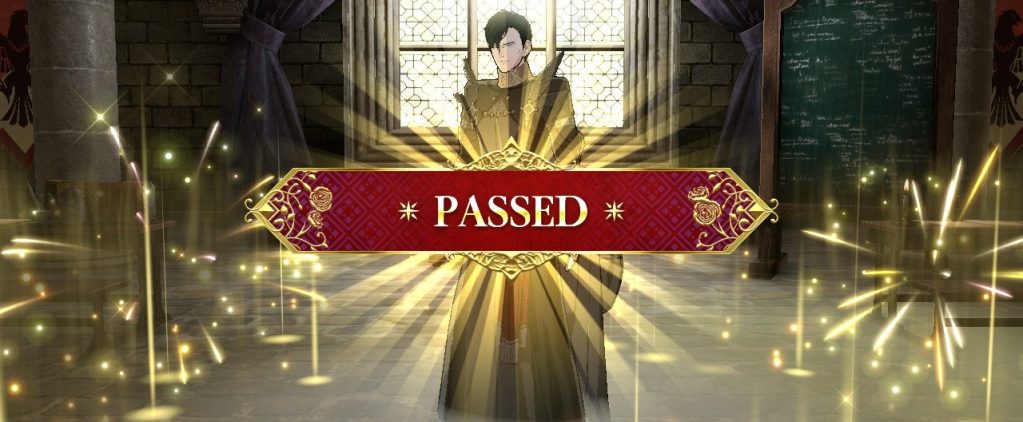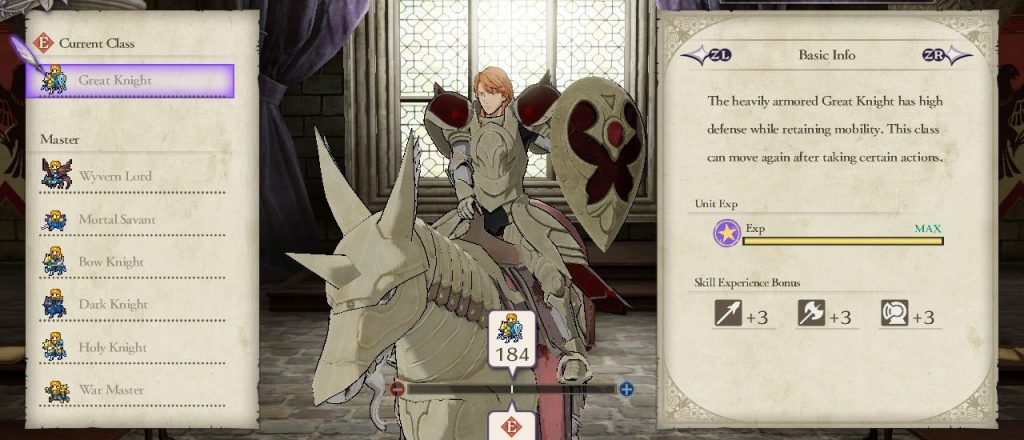Upgrading your units via promotion isn’t exactly an unusual premise for a Fire Emblem game, but the way that Three Houses deals with it may seem unusual for the inexperienced gamer. It’s quite different from series stalwart Awakening for example, where units join you in a base class of sorts, presenting at the very least a soft illusion of restricted choice. Rather Three Houses opts for an open ended approach that sees most initial characters start out as a generic base class – commoner or noble – leaving even the most basic of archetypal customisation up to the player as they level; that bulky lad might look like an ideal Knight of sorts, but it’s up to you to make it happen. This freedom allows for a great deal of creativity of course, but it can leave players questioning whether it’s a good idea to immediately promote, and if not then when and why they should promote into another class? Should they perhaps try multiple classes per tier, or shuffle over to the next as soon as possible? Join us below as we try to clear up as many of these queries as possible.
Promotion Planning

It’s worth noting at the outset here that our first point doesn’t really concern the hardened Fire Emblem fan, after all they’ve probably decided the class choice and route that they’re going to take each and every character before they even saw the box art. You all know who you are and whilst we do love you in a slightly frightened way, let’s spare a moment for the more inexperienced among us and first list out the main benefits to promoting a unit:
- Increased Statistics
- Increased Growth Rates
- New Skills
- Alternative Weapons
- Improved Movement
Those being the main reasons for doing so, we must emphasise that you should plan. Plan, plan and then plan some more. These games are designed for people that look a level deeper than usual, and whilst we fully recommend that you do a ‘seat of the pants’ run on your first play through, there is ultimately more benefit to deciding just how you want a unit to progress before you let it happen. Ask yourself, what do you want this particular unit to be? Perhaps it’s a chunky tank designed to soak up damage, in which case you might want to pick up some defensive skills and statistics as you level. Maybe it’s the ultimate healer, in which case you’ll want to ensure you end up as a Gremory to double those spell charges. Again, take your time to plan out exactly what you want and which stops you’ll have to make on the way.
Advertisement
When To Promote

So you’ve planned out the best possible route for all of your units. Each of them has their journey mapped out, skills earmarked and you’re heading out to plow through paralogues and gain them as much experience as possible. Unfortunately your planning job isn’t quite done yet, because you must decide exactly when you should promote. This may seem like an easy decision, after all there are thresholds that must be met when attempting to progress, but things aren’t quite as simple as they seem – the following should be considered prior to taking the leap:
- Does the character need the additional stats?
- Will the subsequent growth rates benefit the character?
- Are the subsequent class skills necessary for your unit goals?
These items are made even more complicated due to the unusual nature of class upgrades. Sword users are the best examples of this, because their natural progression will take them through Swordmaster or Assassin, yet their ‘canon’ Master upgrade is the hybrid magic Mortal Savant, which raises the question of whether or not you want your unit to be casting magic or not. If you do not, and you have not included any other forms of training outside of Sword and perhaps Bow, is it even worth promoting at this point, or even at all? In some cases the stat upgrades might be worthwhile, but the loss in growth rates found in Master tier classes may actually end up being a negative! As such, we tend to align each of our characters with one of the following rules.
You Should Promote When:
- If a unit has learned all of the skills you require from their current class and..
- Stat changes from the upgrade will make a significant change to their performance.
- Subsequent growth rates are good, or acceptable enough to justify learning the new skills and taking the statistical upgrades.
Wait or Do Not Promote When:
- The unit has yet to learn a skill that is deemed critical in their current class.
- Growth rates in the subsequent class are not good enough to justify the small stat upgrades and..
- New skills learned are not good enough to justify the small gain in stats and poorer growth rates.
Advertisement
Master Classes

Throughout this article we have brought to light the possibility that you may not want to upgrade into a higher class, mainly due to the poor growths outweighing any stat increases and skills that the class will grant. This is almost exclusively a problem with the Master classes, which seem to be positioned as an ending ‘destination’ of sorts rather than something that supports further statistical growth. In some cases, though we’d recommend that you check them at Serenes Forest, growths in the Master classes are nowhere near good enough, so consideration must be given before taking what is likely to be your final class jump. Some examples of this decision are as follows:
- There is no interest in taking the lower growths or skills from Mortal Savant, so we would choose to study both Swordsman and Assassin in the Advanced tier. Both of the Advanced versions have +20% Speed growth, but the Master class Mortal Savant has -10% !?
- The Gremory Master class retains some good growths and doubles uses of all magic types, making it very much worthwhile promoting into.
- The Bow Knight will gain mounted movement and some skills when promoting from a Sniper, but the growths are much, much worse. In this case, perhaps you want to stick with Sniper for a bit to gain some statistical power before you move on.
Finally we must reiterate something that a surprising amount of players do not understand: There is no need to promote into a Master class at all. Some of your units will be good enough to remain within their Advanced versions. They will only miss out on skills that you may not need, and there is a good chance that their growths will make up for the stat upgrades they do not get. This is emphasised even further by the Cindered Shadows DLC, which introduces 4 powerful class options that are perfectly reasonable end destinations, again outside of the Master tier.

Categories: Fire Emblem: Three Houses


